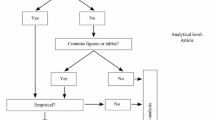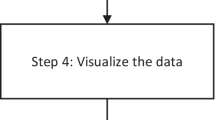Abstract
The production of scientific knowledge is a complex social process, where many actors contribute by their publications to the disclosure of the hidden truth. However, due to different methods, analysed samples, and control variables, empirical findings from this process are often contradictory. Thus, quantitative sciences use meta-analyses in order to extract the likely truth from a corpus of publications about a given research question. Unfortunately, this procedure is often impaired by different forms of the so-called publication bias: papers with null-results are sometimes not published due to the publication policy of journal editors and their boards. Similarly, articles with a high news value may have a better chance of being published, even if their findings finally prove to be wrong. Thus the publications used for meta-analyses are often distorted and lead to wrong conclusions about the truth. For this reason the present article develops a formal model of the effects of the publication bias on the results of meta-analyses. It is successfully tested with empirical data and used for studying the conditions, under which meta-analyses disclose, obscure, or revert the underlying truth. As a main result of the related computer simulations it turns out that the publication bias has for true zero-relations other consequences than for true non-zero relations. Moreover, there are situations where certain forms of the publication bias have unexpectedly favourable effects on the disclosure of the truth by meta-analyses.
Similar content being viewed by others
References
Bell, R. (1992). Impure science: Fraud, compromise and political influence in scientific research. New York: Wiley.
Borenstein, M., et al. (2009). Introduction to meta-analysis. Chichester: Wiley.
Brumback, R. (2015). “3…2…1… impact [factor]: Target [academic career] destroyed!”: Just another statistical casualty. In B. Cronin & C. Sugimoto (Eds.), Scholarly metrics under the microscope (pp. 553–574). Medford: Information Today.
Button, K., et al. (2013). Power failure: why small sample size undermines the reliability of neuroscience. Nature Reviews/Neuroscience, 14, 365–376.
Côté, I., & Jennions, M. (2013). The procedure of meta-analysis in a nutshell. In J. Koricheva, J. Gurevitch, & K. Mengersen (Eds.), Handbook of meta-analysis in ecology and evolution (pp. 14–24). Princeton: Princeton University Press.
Dickersin, K. (2005). Publication bias: Recognizing the problem, understanding its origins and scope, and preventing harm. In H. Rothstein, A. Sutton, & M. Borenstein (Eds.), Publication bias in meta-analysis: Prevention, assessment and adjustments (pp. 11–33). Chichester: Wiley.
Dittmar, H., et al. (2014). The relationship between materialism and personal well-being: A meta-analysis. Journal of Personality and Social Psychology, 107, 879–924.
Franco, A., et al. (2014). Publication bias in the social sciences: Unlocking the file drawer. Science, 345(6203), 1502–1505.
Franzen, M. (2011). Breaking news: Wissenschaftliche Zeitschriften im Kampf um Aufmerksamkeit (Breaking news: Scientific journals struggling for public attention). Baden-Baden: Nomos.
Halpern, S., & Berlin, J. (2005). Beyond conventional publication bias: Other determinants of data suppression. In H. Rothstein, A. Sutton, & M. Borenstein (Eds.), Publication bias in meta-analysis: Prevention, assessment and adjustments (pp. 303–317). Chichester: Wiley.
Harcup, T., & O’Neill, D. (2017). What is news? News values revisited (again). Journalism Studies, 18(12), 1470–1488.
Jennions, M., et al. (2013). Publication and related biases. In J. Koricheva, J. Gurevitch, & K. Mengersen (Eds.), Handbook of meta-analysis in ecology and evolution (pp. 207–236). Princeton: Princeton University Press.
Kulinskaya, E., Morgenthaler, S., & Staudte, R. (2008). Meta analysis: A guide to calibrating and combining statistical evidence. Chichester: Wiley.
Martin, G., & Clarke, R. (2017). Are psychology journals anti-replication? A snapshot of editorial practices. Frontiers in Psychology. https://doi.org/10.3389/fpsyg.2017.00523.
Monastersky, R. (2015). The number that’s devouring science. In B. Cronin & C. Sugimoto (Eds.), Scholarly metrics under the microscope (pp. 539–552). Medford: Information Today.
Roberts, C., & Stanley, D. (Eds.). (2005). Meta-regression analysis: Issues of publication bias in economics. Oxford: Blackwell.
Rosenthal, R. (1979). The “file drawer problem” and tolerance for null results. Psychological Bulletin, 86(3), 638–641.
Rosenthal, R. (1991). Meta-analytic procedures for social research (revised edition). Newbury Park: Sage.
Stoto, M. (2000). Research synthesis for public health policy: Experience of the Institute of Medicine. In D. Stangl & D. Berry (Eds.), Meta-analysis in medicine and health policy (pp. 321–357). New York: Dekker.
Author information
Authors and Affiliations
Corresponding author
Appendix
Appendix
See Table 1.
Rights and permissions
About this article
Cite this article
Mueller, G.P. When the search for truth fails: A computer simulation of the impact of the publication bias on the meta-analysis of scientific literature. Scientometrics 117, 2061–2076 (2018). https://doi.org/10.1007/s11192-018-2942-0
Received:
Published:
Issue Date:
DOI: https://doi.org/10.1007/s11192-018-2942-0
Keywords
- Publication bias
- Zero/non-zero relations
- News value
- File drawer problem
- Meta-analysis
- Computer simulation











